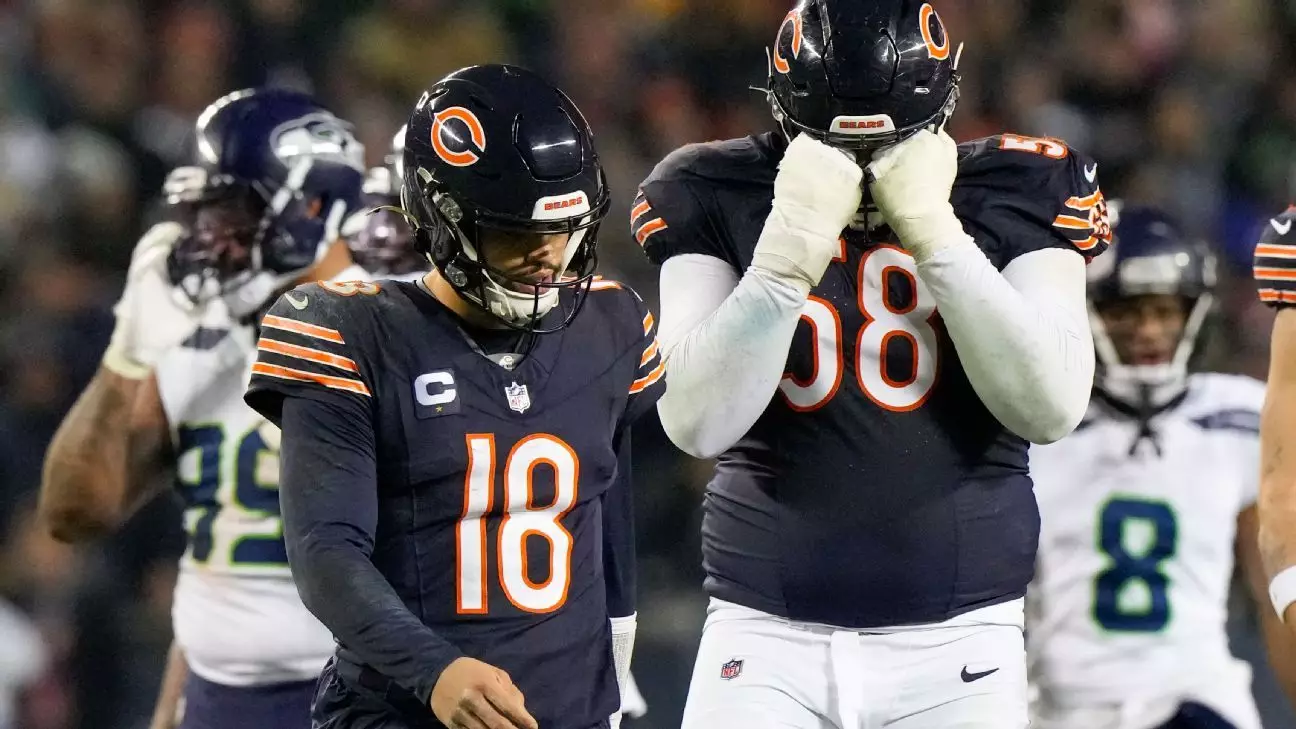In a season marred by turmoil, the Chicago Bears faced their tenth consecutive loss, culminating in a frustrating 6-3 defeat to the Seattle Seahawks. This matchup not only solidified a grim chapter in the Bears’ 2024 campaign, but it also highlighted persistent issues with time management and decision-making on the field. The game marked yet another low point for a team struggling to establish a winning culture, following the dismissal of coach Matt Eberflus just a month earlier.
The Bears’ offensive performance against the Seahawks was dismal. Totalling a mere 179 yards marks one of their lowest outputs of the season, reflecting a troubling trend for a team that has consistently failed to find its rhythm. While defensive strategies and strong performances from individual players might offer glimpses of promise, the collective unit continues to falter in critical moments. Only managing to score three points despite being in a position to tie the game signifies a failure that goes beyond individual errors—it speaks to a broader lack of cohesion and direction.
Under interim head coach Thomas Brown, the Bears’ offensive strategy seemed inconsistent. The game against the Seahawks was a glaring reminder of how essential strategic planning is under pressure. The mismatch in game strategy and execution was evident, particularly in the final drive when the offense squandered opportunities to put points on the board.
One of the most glaring issues during the game was the Bears’ inability to efficiently manage the clock. With 5 minutes and 12 seconds left in the game, Chicago began its final drive backed up at its own 11-yard line and had all three timeouts available. Despite this advantage, the Bears failed to capitalize. The series of plays that followed only demonstrated confusion rather than urgency. As a result, they allowed precious seconds to tick away, ultimately failing to secure a potential game-tying field goal.
Simply put, the Bears had once again locked themselves into a situation reminiscent of their earlier loss to the Detroit Lions. The inability to use timeouts effectively reflects a severe lack of situational awareness that brings into question the decision-making process of the interim coaching staff. The confusion on the sidelines was palpable, indicating that the atmosphere surrounding the team is fraught with pressure and uncertainty.
The controversial decision by Coach Brown to switch from punting to offensive play on fourth-and-inches represents a critical moment in the game. Although he indicated a desire to be aggressive, the misstep placed the Bears in a precarious position. In the theater of the NFL, such choices can define games. Here, the coaching staff’s inclination to change tactics mid-drive contributed to the chaotic sequence of events.
Thus, when quarterback Caleb Williams ultimately connected with DJ Moore for a 14-yard gain following the fourth-down conversion, it seemed to be a moment of reprieve. However, the optimism was short-lived as the team once again failed to execute effectively thereafter. The Bears exhibited a lack of clarity and purpose on offense, failing to translate momentum into points—a critical miscalculation that echoed throughout the game.
The emotional landscape for players was equally troubling. After being battered by Seattle’s defensive line, quarterback Caleb Williams exhibited visible frustration as time slipped away during key plays. The tensions on the field demonstrated that the athletes were battling not just their opponents, but also an internal struggle against a failing system. Miscommunication and a lack of clarity resulted in a chaotic sideline atmosphere, contributing to further complications in executing plays.
Teammates expressed their feelings of discontent post-game, suggesting that the players themselves felt the weight of technical failures resulting in timeouts being wasted. Prominent receiver DJ Moore was clear about the disarray, indicating that team dynamics were already challenged before they stepped onto the field.
As the Chicago Bears navigate the closing moments of a tumultuous season, introspection will be vital. The loss to the Seahawks should serve as a catalyst for change—not just in personnel but in the underlying philosophy of a team searching for a new identity. As the clock continues to tick on their disastrous campaign, it begs the question: can the Bears learn from their myriad mistakes and pull together as a cohesive unit, or are they doomed to repeat the same errors? The road ahead is uncertain, but clarity, communication, and a commitment to excellence will be the keys to their eventual resurgence.

